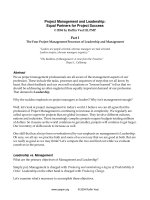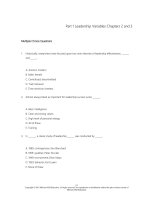Lecture Art of Leadership and Motivation - Lecture 29
Bạn đang xem bản rút gọn của tài liệu. Xem và tải ngay bản đầy đủ của tài liệu tại đây (477.09 KB, 23 trang )
Art of Leadership & Motivation
HRM – 760
Lecture 29
FACILITATOR
Prof. Dr. Mohammad Majid Mahmood
Delegation
2
"If you have a difficult
task, give it to a lazy
man – he will find an
easier way to do it" –
Hlade's Law
3
Human Resources are the most
important asset of any
organization.
Most human resources and business
professionals understand this but it is
alarming how few are able to
implement it. Why is this?
4
Delegation defined
Delegation is the process that makes
management possible, because
management is the process of getting
results accomplished through others.
Managerial Functions:
5
Delegation
Unless you delegate tasks to your
subordinates, your team will become
inefficient and demoralized.
"I not only use all the brains I have,
but all I can borrow."
- Woodrow Wilson
6
Why Delegate?
Globalization,
Information technology explosion,
Increased mergers,
Heightened competition, and
Higher expectations of nearly every customer
it just isn't possible to still be that one person in control of everything.
Bringing in others to manage is an absolute necessity for survival now.
You must perform only "essential activities" that give the company its
competitive advantage.
Learn to do less and manage more.
The delegation task is in finding the right persons and giving them the
right work.
7
Tasks you should not
delegate
Following activities are sensitive & should
not be delegated:
Hiring
Firing
Pay issues
Policy
8
Advantages of
Delegation
9
Advantages of Delegation
Positive aspects of delegation include:
Higher efficiency
Increased motivation
Develops the skills of your team
Better distribution of work through the
group
Faster decision-making
10
Advantages of Delegation
The organization: increased
productivity.
The department / team: becomes
more enthusiastic, active, and
successful.
Employees: career development,
increases energy.
11
Advantages of Delegation
Build human resource capabilities
Encouraging radical ideas and risk-taking
Improving employee performance to an
optimum level
Being a stronger, more productive company
Handling change easily and encouraging
growth
Bringing out the very best in people and
unlocking potential
12
Four Stages to Successful
Delegation
Assume that people who work for you have
ability and show you have confidence in them
Be specific about what is expected. Tell the
person:
what should be done;
why it is needed; and
when it should be completed
Tell them what should be done, but don't tell
them how.
Give credit and praise generously if a person
does a good job
13
Disadvantages of
Poor Delegation
14
Poor Delegation
Signs that your delegation is failing include:
Human Resource morale is down
You are always working late
Your team is confused / conflicting / tense
Not delegating a task because you think that
you would do it better than anyone else is a
poor excuse. Doing this, will just make life
difficult for yourself.
15
Disadvantages of
Poor Delegation
Limitations of this approach: assigning
authority does not mean that someone
has the ability, motivation, and
understanding necessary to perform.
16
6 Steps to Motivation
The following steps can be taken to help
achieve and maintain motivation:
1.
2.
3.
4.
5.
6.
Provide opportunities for human
resources
Indicate the importance/value of the
human resources.
Make people feel they are important.
Clarify goals.
Identify progress.
Acknowledge achievements.
17
Disadvantages of
Poor Delegation
Are the involved parties coming to you
angry and confused? Delegating a
project to one department is likely to
have implications for other departments.
Keep it in mind as you delegate.
18
Disadvantages of
Poor Delegation
Deliberate Redundancy
If you're thinking that assigning the same
task to multiple managers inspires
healthy competition, you're sadly
mistaken. This type of delegation
actually inspires conflict.
19
Disadvantages of
Poor Delegation
Much like parents who do a child's
homework thinking they're helping.
When you delegate responsibility,
delegate the earned positive/negative
consequences.
20
Disadvantages of
Poor Delegation
Delegating to weakness
Delegating tasks outside the scope of
one's competence.
Classic examples of this include putting
the financial officer in charge of
marketing.
21
Conclusion
Effective delegation will enable you to:
develop good people,
it will save you time, and
it will give your business the characteristics
of a well-oiled machine.
Poor delegation will get you:
frustration,
poor task execution, and
a group of demotivated employees.
22
FACILITATOR
Prof. Dr. Mohammad Majid Mahmood
1-23









